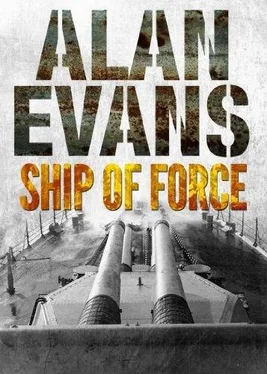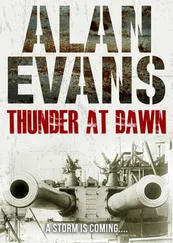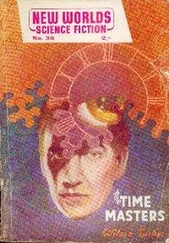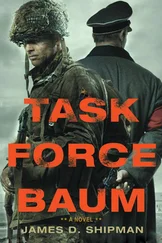He said, “Steer north-east! Mr. Sanders! Make ready to drop one of the life-rafts over the side and get some waste and paraffin from the engine-room. I want the raft packed with waste and all well-soaked in paraffin.”
“Aye, aye, sir.” Sanders gave him a baffled look but dashed away.
Dunbar looked questioningly at Smith but got no explanation. Smith was shifting restlessly about the bridge, his gaze going from monitor to tug to the launches that were hauling out to seaward.
Sparrow came around and headed north-east, leaving the monitor and the tug astern as another salvo burst still farther inshore but still on that same bearing that lay across the monitor and now they would lift the range again, feeling towards her.
Sanders bawled up from the iron deck. “Raft’s ready, sir!”
Smith snapped, “Stop her, Mr Dunbar.”
“Stop both!”
The way came off Sparrow and she rocked gently to the sea as the raft was lowered over the side, held briefly until Sanders, at Smith’s shouted instructions, lit a handful of paraffin-soaked waste and dropped it on to the raft.
Sanders yelped, “Shove off!” The raft was thrust away, smouldered and smoked then burst into flame with a roar as Sparrow pulled away.
Smith wondered if it would work, thought it had a chance as he peered through his glasses at the monitor and the tug seen dimly through the murk and saw the salvoes come down, one short, then tense minutes later one just over, so close that the men on both ships must have been beaten by the spray, shaken by the blast.
Sparrow was heading back to them now, coming up with the monitor. He glanced astern and saw the flaming orange beacon that was the raft.
They waited for it. Then it came, the too-familiar, gut-tensing roar and shriek and they saw the salvo fall to seaward, a quartermile to seaward and astern; and it had been fired at the blazing raft.
Dunbar snorted, “Fooled ’em!” He grinned appreciatively.
Smith was just glad. And if the ruse had been successful it would not succeed for long. The raft would burn out and anyway the squall was passing and soon would no longer hide them. Set the launches to making smoke again? But the tug was easing away, making her own smoke as she slowly took up the slack of the tow. For an instant she checked with the tow barely curved. Smith held his breath. But Garrick would have that hawser made fast to a shackle of the monitor’s anchor cable to give weight to the tow, more elasticity and thus more strength. Lively Lady nudged ahead and drew Marshall Marmont after her.
Smith thought it was none too soon, though Mrs. Baines had proved she knew her job, and more. He sent the launches off to find their own way home. Sparrow steamed around and around the monitor and tug, keeping again her watch for submarines and making smoke that was needed now to cover the creeping ships as the squall swept on and left the same grey sea and sky with a rare glimpse of a watery sun. The shore batteries shifted target from the burnt-out raft and fired steadily. They got close to the monitor and once, by mistake, dangerously close to Sparrow , the salvo bracketting her and setting her tossing, deafening all aboard, hurling spray that again stank of explosive across her decks. She steamed through it and as Smith’s ears ceased ringing he heard one of the crew of the twelve-pounder singing dolefully, “Oh, I do like to be beside the sea-side! I do like to be beside the sea…”
Smith’s little command limped away and gradually the range opened until the shore batteries ceased firing. For a few minutes there was peace as Sparrow swung around ahead of the tug and monitor and turned to pass down to seaward of them. Then came the look-out’s yell, “Aircraft bearin’ green two-oh!”
They were flying high, heading out from the Belgian coast, specks against the grey sky and now seen then lost as cloud hid them. But then they were coming down in a dive that was shallow at first as they turned towards the ships, then steepened. Smith watched them through his glasses until he could see the crosses on the wings and then lost those crosses as the machines swept down on the sea.
Smith said, “Take station astern of Marshall Marmont .”
“Full ahead both!” Dunbar rapped it out then jammed the glasses to his eyes again. He said, “Rumplers.”
Smith grunted, took his word for it. They were biplanes, buzzing like hornets as they came in low over the sea, barely a hundred feet above it. Heads showed like footballs above the open cockpits. There was a machine-gun mounted in the after cockpit and bombs in their racks under the wings. Their exhausts stuck straight up from the engines for a foot or more and seemingly right behind the propeller. They streamed oily smoke above the pilot’s head.
Sparr ow had run down past monitor and tug to seaward of them and swung around well astern of Marshall Marmont as Dunbar yelled, “All guns commence!”
Sparrow ’s guns opened fire, the six-pounders barking and the twelve-pounder slamming away on the bridge, the smoke whipping away on the wind of her passage, the ejected empty cartridge cases flying and clanging across the deck. Marshall Marmont was firing too. Not the huge fifteen-inch that would not bear aft anyway, but the two anti-aircraft guns she carried in the stern. And then as the Rumplers tore in, their speed now suddenly apparent as they closed the ships, the Vickers machine-guns on the ships added their chatter to the din. There were bursts all around the aircraft but they grew in Smith’s eyes until they lifted, snarled overhead and on, higher now, two hundred feet or more. One — two — three. A spread line, one behind the other, a couple of hundred yards apart, leaving Sparrow and heading for the fat target, the monitor dragged along at the end of the tow. They swept over her and Smith saw the bombs fall, the Rumplers shedding their entire load so the bombs seemed to rain down. They fell abeam and astern and ahead of her. The tug’s stern lifted and fell and a tower of water half-bid her. Was the tug all right? The Lively Lady chugged on and Marshall Marmont followed her.
The guns ceased hammering and chattering in response to bellowed orders as the Rumplers shrank and became tiny with distance, climbing far ahead. But they were turning. They wheeled, seemingly slowly, and their formation broke up as they scattered to come back at Smith’s flotilla, one on either side, one from ahead.
Sparrow was making twenty knots now and pouring out smoke from her funnels as she thrust up abreast of the monitor and tug and then passed them to take station ahead. Smith glanced astern and saw them receding, said quietly, “Good enough.”
“Half-ahead both!” Dunbar ordered.
Now Sparrow was again where Smith wanted her, where she could meet the attack first but the Rumplers were split now — “Turn her broadside to ’em Mr. Dunbar!”
“Port ten!”
Sparrow turned, showing her side to the raiders so she could at any rate fire her puny broadside of the twelve-pounder and three of her six-pounders and they opened up as the Rumplers came in, starting to dive and weaving with their biplane wings rocking. They snarled in and passed low over the ships with the trails from their exhausts criss-crossing. The one that ripped over Sparrow seemed to flick past the masthead. Smith saw the scarf trailing back from the pilot’s throat like a pennant, the machinegunner standing up in the rear cockpit to fire down at the thirtyknotter right under him. Then the Rumplers were gone, forming up again beyond the ships and heading for the coast. The guns ceased firing.
Читать дальше












